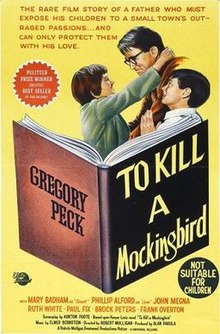Here are several DVD selections that are entertaining, reassuring and yes, unifying.
MOVIES: Can films heal a divided nation?

by Phil Boatwright
Date: January 11, 2019 – Friday
KANSAS CITY, Kan. (BP) — Despite our differences, and possibly because of them, we share a unique stewpot commonality: We’re all Americans.
At times, movies have reminded us of that fact — times when the motion picture industry has both served to admonish us and unite us.
Here are several DVD selections that are entertaining, reassuring and yes, unifying.
“To Kill a Mockingbird” (1962).
Gregory Peck won a deserved Best Actor Oscar for his portrayal of attorney Atticus Finch in this tale of rural life, justice and bigotry as seen through the eyes of Finch’s 9-year-old daughter, Scout. A beautifully photographed black-and-white movie with a haunting score by Elmer Bernstein, it exposes wrongs and offers solutions by way of change in the thinking of man, and a willingness to see the other guy’s point of view.
As Atticus Finch states in the movie, “You never really understand a person until you consider things from his point of view … until you climb into his skin and walk around in it.”
Though justice is not immediately found, the film points to coming change. After Atticus’ summation of the innocence of a black man falsely accused of raping a white woman, a black minister and others in the courtroom’s balcony stand and he requests that Scout also stand as her father exits the courtroom. The show of respect for Atticus as a good man demanding justice for all points to the truth that when good men fight for right, change will come.
Ken Burns’ “The Civil War” (1990)
In this quintessential documentary on the War Between the States, Burns relays intimate personal stories about the heart of the people of the time, revealing their foibles and their nobility. I believe that viewing this film can help us to understand the devastating outcome of divisiveness.
It’s important to expose wrongs, but just as important to remind future generations of the fact that people have fought and died to correct those wrongs. Ken Burns assembles letters and authorities on the subject, brilliantly compiling one of the best, most informative and most spiritually touching works of art ever to be shown on television. The made-for-PBS miniseries is historical storytelling at its best. Indeed, this six-disc DVD set should be viewed by every high school student.
“The Best Years of Our Lives” (1946)
Fredric March, Myrna Loy and an all-star cast of their day help tell a sensitive story of returning WWII servicemen and how they must adapt to civilian life. A winner of seven Oscars, including Best Picture, the film also deals with prejudice and longing, but without offensive language or sexual explicitness. It reminds us that when wars end, struggles often continue for those who were willing to make the sacrifice and risk their lives for their country.
I chose to include The Best Years of Our Lives because when we see what others go through after serving their fellow citizens, the sense of gratitude we feel can be a unifier.
“America’s Heart and Soul” (2004)
Though I’ve spotlighted this before, I can’t recall another film that so joyously illustrates our country’s people. And I think we could all use a little joy these days.
Filmmaker Louis Schwartzberg’s goal was to capture both the unparalleled beauty of the U.S. and the incomparable spirit of its people. Here you have the chance to meet ordinary Americans with extraordinary stories, and Schwartzberg’s gift is his ability to connect with people, honestly capturing their values and dreams. America’s Heart and Soul is a celebration of a nation told through the voices of its people.
So, can a divided nation be healed by movies? By themselves, no. Ah, but, the Holy Spirit works in wondrous ways. He uses us, nature and sometimes even the arts to speak to a conflicted soul and a broken nation.
When you think about it, we all want the same things. We want to be warm, well-fed, loved and acknowledged. But there always seems to be two paths to those destinations — our way and the other guy’s. Here’s the cornerstone some people stumble over: While many feel that law is the glue that binds us together, we people of faith believe Jesus is necessary to fulfill the law.
Though that statement will cause the eyes of agnostics to roll, is it really too simplistic to suggest that the ills of the world are due to the exclusion of Christ? Despite all of man’s mandates, judicial procedure doesn’t seem to be healing or bringing us together as much as lawgivers had hoped.
The cinema can spotlight problems and suggest solutions, but we’ll only find lasting peace within and with one another when individuals and a nation first acknowledge God and then revere Him.
As 2 Chronicles 7:14 tells us, “If my people, which are called by my name, shall humble themselves, and pray, and seek my face, and turn from their wicked ways; then will I hear from heaven, and will forgive their sin, and will heal their land.”
Phil Boatwright is the author of “MOVIES: The Good, the Bad, and the Really, Really Bad,” available on Amazon.com.
The original story can be found at: http://www.baptistpress.com/52227/movies-can-films-heal-a-divided-nation
Reprinted from Baptist Press (www.baptistpress.com), news service of the Southern Baptist Convention.




Comments are Closed